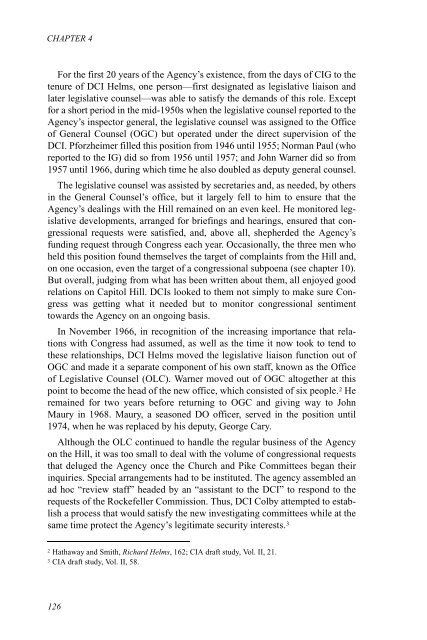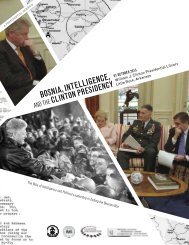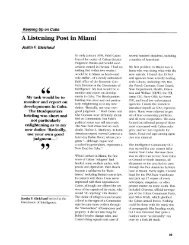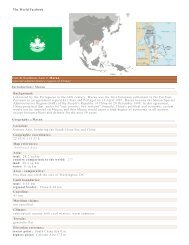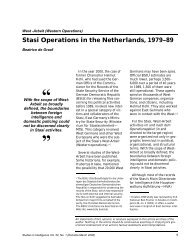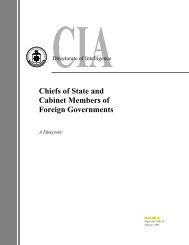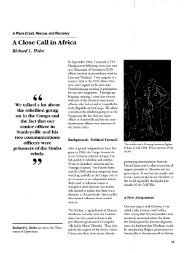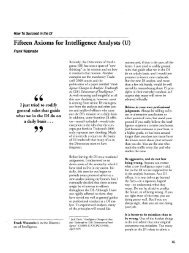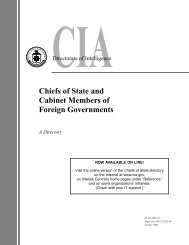CHAPTER 4 - Central Intelligence Agency
CHAPTER 4 - Central Intelligence Agency
CHAPTER 4 - Central Intelligence Agency
You also want an ePaper? Increase the reach of your titles
YUMPU automatically turns print PDFs into web optimized ePapers that Google loves.
<strong>CHAPTER</strong> 4<br />
For the first 20 years of the <strong>Agency</strong>’s existence, from the days of CIG to the<br />
tenure of DCI Helms, one person—first designated as legislative liaison and<br />
later legislative counsel—was able to satisfy the demands of this role. Except<br />
for a short period in the mid-1950s when the legislative counsel reported to the<br />
<strong>Agency</strong>’s inspector general, the legislative counsel was assigned to the Office<br />
of General Counsel (OGC) but operated under the direct supervision of the<br />
DCI. Pforzheimer filled this position from 1946 until 1955; Norman Paul (who<br />
reported to the IG) did so from 1956 until 1957; and John Warner did so from<br />
1957 until 1966, during which time he also doubled as deputy general counsel.<br />
The legislative counsel was assisted by secretaries and, as needed, by others<br />
in the General Counsel’s office, but it largely fell to him to ensure that the<br />
<strong>Agency</strong>’s dealings with the Hill remained on an even keel. He monitored legislative<br />
developments, arranged for briefings and hearings, ensured that congressional<br />
requests were satisfied, and, above all, shepherded the <strong>Agency</strong>’s<br />
funding request through Congress each year. Occasionally, the three men who<br />
held this position found themselves the target of complaints from the Hill and,<br />
on one occasion, even the target of a congressional subpoena (see chapter 10).<br />
But overall, judging from what has been written about them, all enjoyed good<br />
relations on Capitol Hill. DCIs looked to them not simply to make sure Congress<br />
was getting what it needed but to monitor congressional sentiment<br />
towards the <strong>Agency</strong> on an ongoing basis.<br />
In November 1966, in recognition of the increasing importance that relations<br />
with Congress had assumed, as well as the time it now took to tend to<br />
these relationships, DCI Helms moved the legislative liaison function out of<br />
OGC and made it a separate component of his own staff, known as the Office<br />
of Legislative Counsel (OLC). Warner moved out of OGC altogether at this<br />
point to become the head of the new office, which consisted of six people. 2 He<br />
remained for two years before returning to OGC and giving way to John<br />
Maury in 1968. Maury, a seasoned DO officer, served in the position until<br />
1974, when he was replaced by his deputy, George Cary.<br />
Although the OLC continued to handle the regular business of the <strong>Agency</strong><br />
on the Hill, it was too small to deal with the volume of congressional requests<br />
that deluged the <strong>Agency</strong> once the Church and Pike Committees began their<br />
inquiries. Special arrangements had to be instituted. The agency assembled an<br />
ad hoc “review staff” headed by an “assistant to the DCI” to respond to the<br />
requests of the Rockefeller Commission. Thus, DCI Colby attempted to establish<br />
a process that would satisfy the new investigating committees while at the<br />
same time protect the <strong>Agency</strong>’s legitimate security interests. 3<br />
2<br />
Hathaway and Smith, Richard Helms, 162; CIA draft study, Vol. II, 21.<br />
3<br />
CIA draft study, Vol. II, 58.<br />
126


